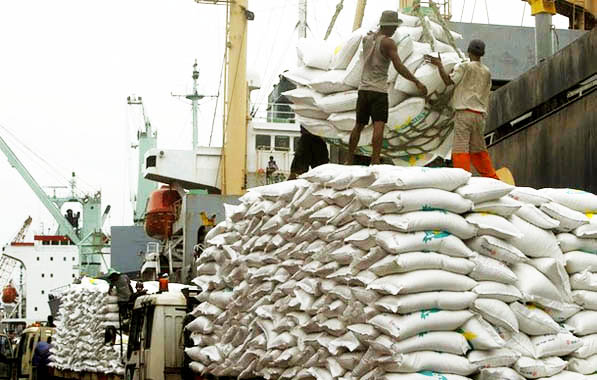
Terminal operators under the aegis of Seaport Terminal Operators Association of Nigeria (STAON), have urged the Federal Government to review its import policies on rice and vehicles. STOAN Chairman, Princess Vicky Haastrup, said that the call had become necessary because the policies were encouraging smuggling into Nigeria.
She noted that there was no economic sense to place any restrictions on the importation of rice into the country. Haastrup explained that neighbouring countries, such as the Republic of Benin and Togo, rather than Nigeria were benefitting from the restrictions on the importation of rice into the country.
According to her, “since local rice producers cannot meet the present demand for rice consumption which is 1.7 million metric tons per annum, it makes no sense to restrict the importation of the commodity. “I agree that we must look inwards as a nation but it has to be properly planned. It has to be gradual so that we do not lose the revenue accruing from import duty on rice to the ports located in our neighbouring countries “All the rice imported into the Republic of Benin and Togo end up in the Nigerian market as a result of the porosity of our borders.
Even if we keep security operatives at the land borders 24 hours, smugglers will still bring in the rice into Nigeria through the numerous illegal routes all over the place. We should not deceive ourselves. We cannot be losing huge revenues while our neighbours are gaining.”
On the National Automotive Policy (NAP), Haastrup said that it had led to the near collapse of roll-on-roll-off terminals operating in the country. Haastrup, who is the Executive Vice Chairman/CEO of ENL Consortium, operators of Terminals A and B of the Lagos Port Complex Apapa said that while the policy was not entirely bad, its implementation had been unnecessarily hasty.
She added: “The implementation of the policy ought to be in phases and gradual. This is due to the fact that there are many things we ought to put in place before we start the implementation of the policy. The auto policy is good. Over time it will help Nigeria and Nigerians to hold their own.
It will also arrest capital flight and provide employment opportunities for our teeming youths presently roaming the streets for nonexistent jobs. “We need to put a structure in place. We need to have the infrastructural facilities on ground. We need a robust steel industry.
We need to have regular electricity supply. This is because if you buy diesel at the prevailing price to power a generator for the production of a car, by the time you add other variables, the cost will be so high that it would be beyond the reach of an average Nigerian. “The cost of the locally produced vehicles would be far ahead of the ones produced overseas. At the end of the day, the essence of the auto policy will be defeated.”
Source: http://newtelegraphonline.com/terminal-operators-seek-review-of-rice-auto-policies/
